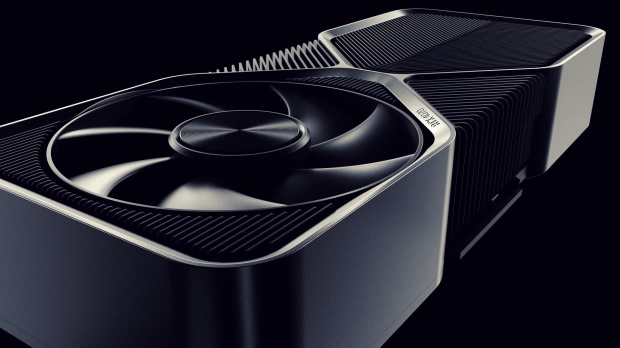With the launch of the GeForce RTX 4070 this week (check out our reviews for multiple models here), we've got a clearer picture of the performance and efficiency gains with NVIDIA's new Ada Lovelace architecture.
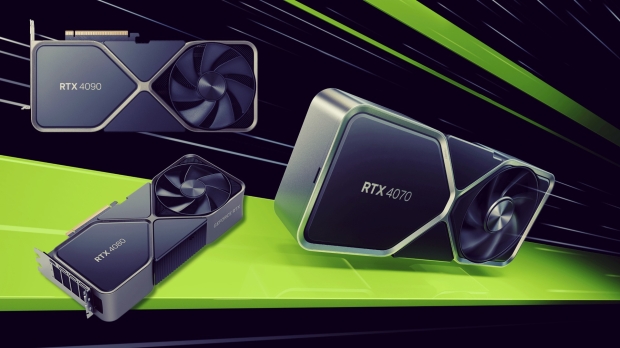
Built on a custom TSMC 4N process, it presents a significant leap forward over the GeForce RTX 30 Series Ampere generation and its use of Samsung 8N regarding overall efficiency. Of course, there are advances in the underlying hardware, with next-generation RT Cores and SER (Shader Execution Reordering) and new AI hardware developed for the new DLSS 3 Frame Generation technology.
Back to the efficiency of Ada, the focus of this article - even though the GeForce RTX 4090 is a 450W-rated GPU, it rarely hits this height and scales remarkably well when it comes to gaming at lower resolutions. Based on averages across 15 Games (for a detailed breakdown of the games tested and settings, check out our review of the GeForce RTX 4070 Founders Edition), the GeForce RTX 4090 not only delivers a 70.7% uplift in performance over the 350W-rated GeForce RTX 3090, but it manages that by only using 5.9% more power.
And with that, let's look at the GeForce RTX 40 Series line-up so far versus the equivalent GeForce RTX 30 Series models, considering both average frame rates and average power usage across 15 games played at 1080p, 1440p, and 4K.
Here's the breakdown of GPUs.
- GeForce RTX 4070 Founders Edition
- GeForce RTX 4070 Ti (MSI Gaming X Trio)
- GeForce RTX 4080 Founders Edition
- GeForce RTX 4090 Founders Edition
- GeForce RTX 3070 Founders Edition
- GeForce RTX 3070 Ti Founders Edition
- GeForce RTX 3080 Founders Edition
- GeForce RTX 3090 Founders Edition
And the test system.
- Motherboard: MSI MPG X670E Carbon Wi-Fi
- CPU: AMD Ryzen 9 7900X
- Cooler: Corsair iCUE H100i RGB PRO XT Liquid CPU Cooler
- RAM: 64GB (2x32GB) Corsair DOMINATOR PLATINUM RGB DDR5 DRAM 5200MHz
- SSD: Sabrent Rocket 4 Plus-G M.2 PCIe Gen 4 SSD 4TB, Sabrent Rocket 4 Plus Plus M.2 PCIe Gen 4 SSD 8TB
- Power Supply: Thermaltake Toughpower GF1 850W
- Case: Thermaltake Core P3 Tempered Glass Snow
- OS: Microsoft Windows 11 Pro 64-bit
First up, we've got 1080p.
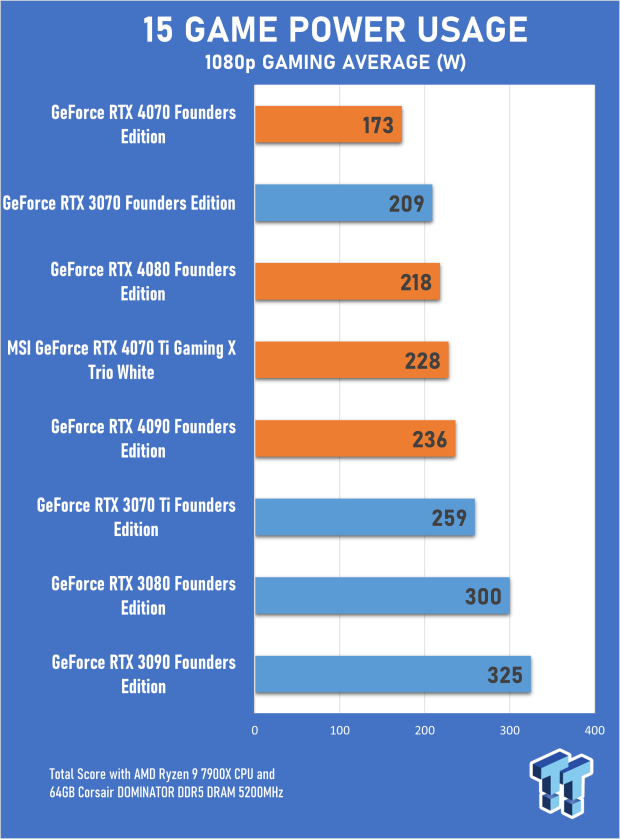
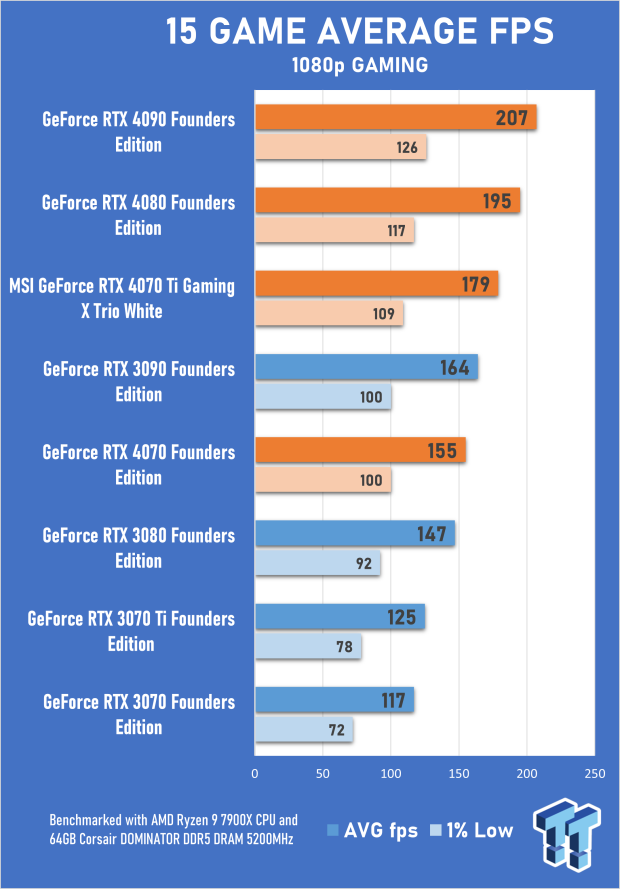
The GeForce RTX 4070 delivers a 32.5% performance increase over the GeForce RTX 3070, using 17.2% less power. For the GeForce RTX 4070 Ti, we see a performance uplift of 43.2% using 12% less power compared to the GeForce RTX 3070 Ti. The GeForce RTX 4080 sees a 1080p performance increase of 32.7% over the GeForce RTX 3080 with an impressive 27% decrease in power. For the big one, the GeForce RTX 4090, you're looking at a performance increase of 26.2% and a 27.4% decrease in power usage over the RTX 3090.
Naturally, 1080p becomes a bottleneck for high-performing GPUs, so let's take a closer look at 1440p.
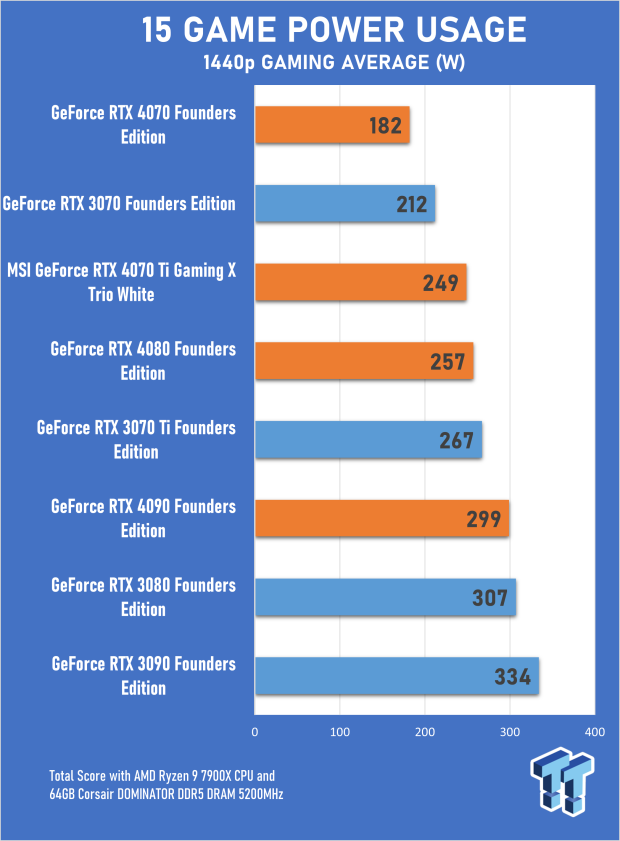
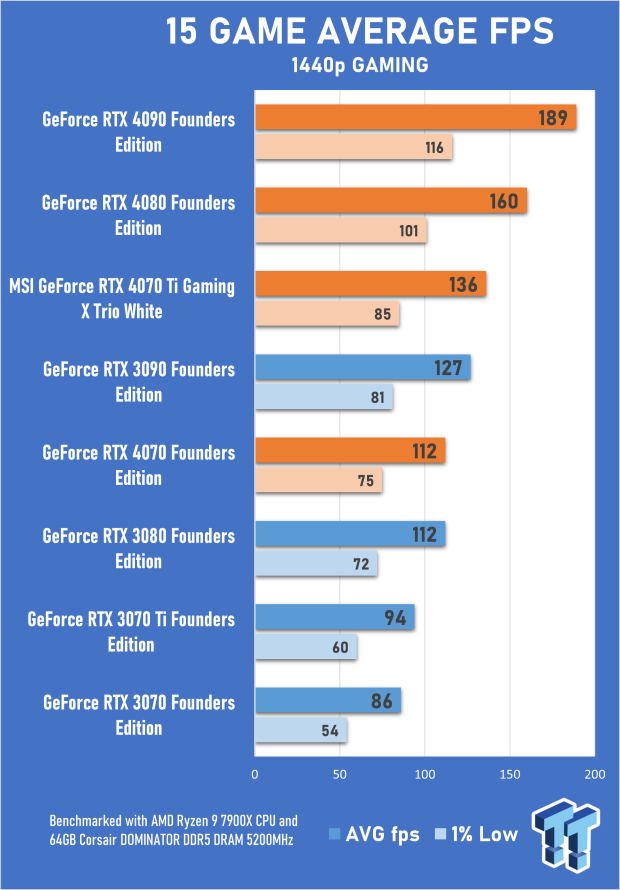
Here the GeForce RTX 4070 delivers a 30.2% performance increase over the GeForce RTX 3070, using 14.1% less power. For the GeForce RTX 4070 Ti, we see a performance uplift of 44.7% using 6.7% less power compared to the GeForce RTX 3070 Ti. The GeForce RTX 4080 sees a 1080p performance increase of 42.9% over the GeForce RTX 3080, with a 16.3% decrease in power. For the flagship, the GeForce RTX 4090, you're looking at an impressive 48.8% performance increase and a 10.5% decrease in power usage when compared to the RTX 3090.
The 1440p data shows that the GeForce RTX 40 Series performance gains don't come from simply increasing the CUDA Core counts and boosting clock speeds to well over 2 GHz. The new architecture is incredibly efficient and scales no matter the configuration, from the cut-down GeForce RTX 4070 to the unlocked GeForce RTX 4090.
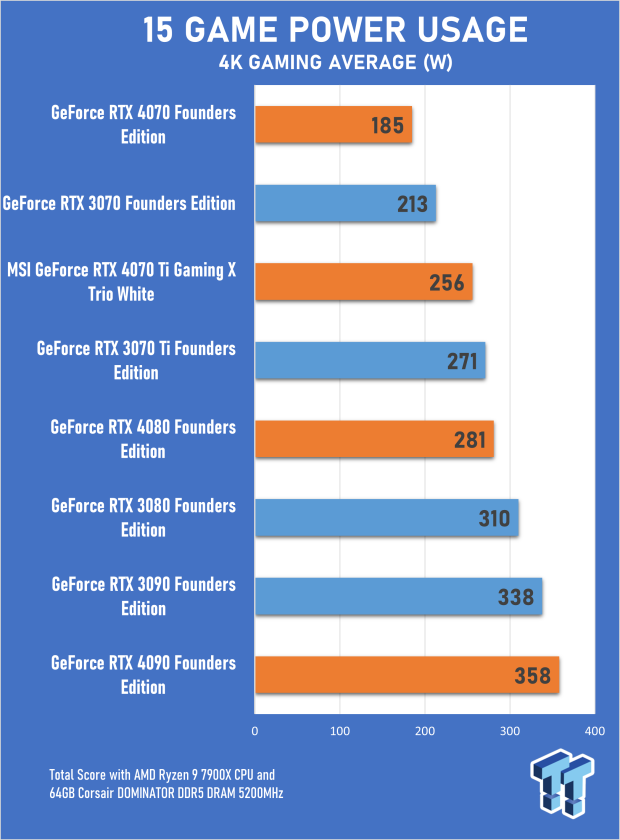
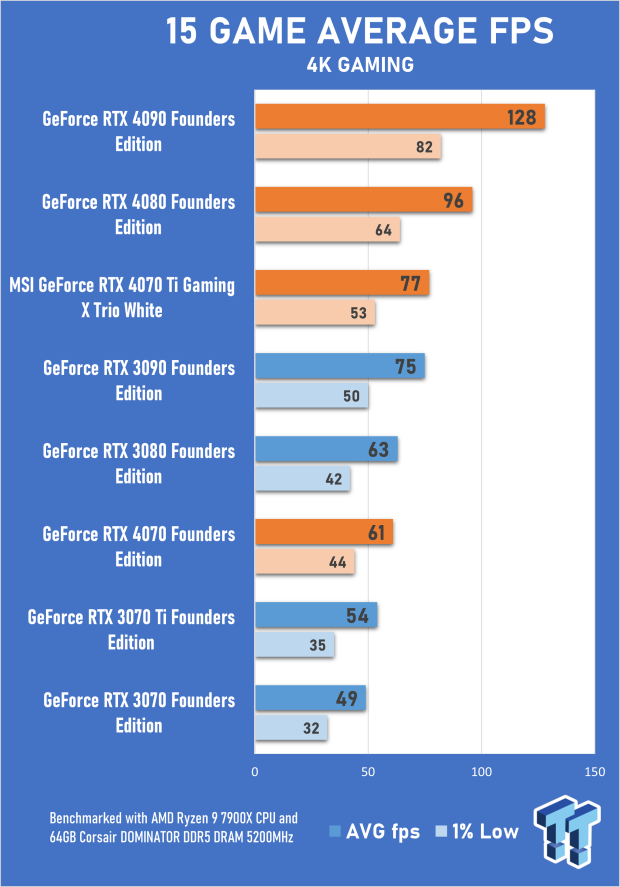
Switching to 4K, the GeForce RTX 4070 delivers a 24.5% performance increase over the GeForce RTX 3070, using 13.1% less power. For the GeForce RTX 4070 Ti, we see a performance uplift of 42.6% using 5.5% less power compared to the GeForce RTX 3070 Ti. The GeForce RTX 4080 sees a 1080p performance increase of 52.4% over the GeForce RTX 3080, with a 9.4% decrease in power draw. This result, in particular, is super impressive for the new 40 Series.
For the flagship, the GeForce RTX 4090, as mentioned earlier, you're looking at a 70.7% uplift in performance over the 350W-rated GeForce RTX 3090, using 5.9% more power.
These figures showcase an impressive generation leap over the GeForce RTX 30 Series for the Ada generation. The only real issue is that the GeForce RTX 40 Series cards (especially on the high-end) are priced notably higher than their previous-gen counterparts. Pricing for GPUs has been a point of contention and debate since the series debuted last year (and during the GeForce RTX 30 Series) and will most likely continue to be a hot topic for GeForce RTX until more mainstream cards arrive or prices drop.
Either way, it's clear that when it comes to in-game performance, everything from the RTX 4070 to the RTX 4090 delivers and does so with an eye toward efficiency.

